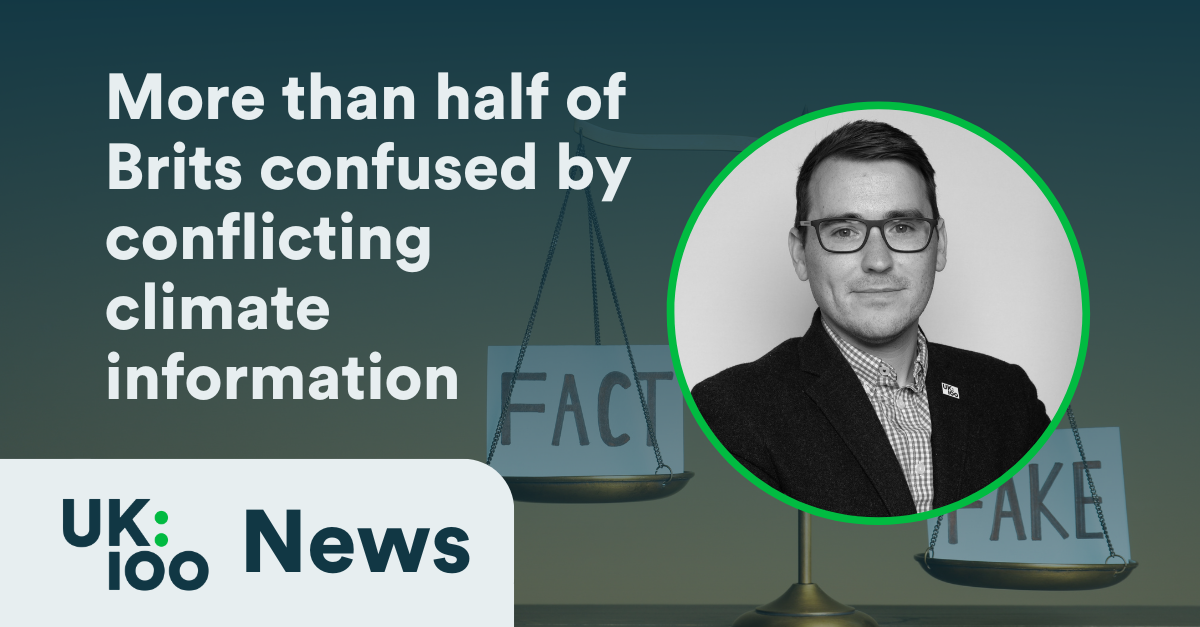
Trust in national government on climate falls to 50%, down from 57% in summer 2024.
LONDON, 28 October 2025 — UK100, the only network of ambitious councils led by all political parties working together to tackle climate change, today highlighted concerning new data from the Department for Energy Security and Net Zero's Public Attitudes Tracker showing that Britons are increasingly overwhelmed by conflicting climate information at the very moment the country needs public support for unprecedented clean energy infrastructure delivery.
The latest DESNZ data reveals that 53% of the public agree there is so much conflicting information about climate change that it's difficult to know what to believe, while 33% agree the media exaggerates climate change impacts. Trust in UK government information on climate change has fallen sharply to 50%, down from 57% in summer 2024.
These findings come as local authorities face the challenge of delivering the government's clean energy superpower mission by 2030, which requires building around five times the amount of energy infrastructure over the next seven years as was built in the previous three decades—including unprecedented rollout of renewable energy, grid upgrades, and community energy projects.
Responding to the data, Christopher Hammond, chief executive of UK100, says:
"Half of Britons don't know what to believe anymore about climate change, and it’s getting worse. That's not just a communications problem — it's an existential threat to delivering lower bills and the clean energy infrastructure this country desperately needs.
"Local authorities are part of the answer. They're consistently rated as the most trusted tier of government on climate action, they influence 82% of UK emissions, and crucially, they understand their communities in ways Whitehall never can. But over half of our members have faced coordinated misinformation campaigns aimed at derailing their climate work. Without the right tools and support, even the most ambitious councils can't break through the noise.
"The government's upcoming public participation strategy for climate action must recognise this reality and back local authorities with the capacity and resources to engage meaningfully with their communities. Local leaders can't deliver a clean energy revolution on goodwill alone."
UK100's evidence shows that meaningful public engagement delivers better outcomes: analysis demonstrates that place-based climate action could save £140 billion compared to top-down national approaches, while communities involved in co-creating climate policies show increased buy-in, reduced opposition, and faster project delivery.
UK100 is calling on government to:
- Ensure the upcoming public participation strategy includes dedicated support for local authorities to deliver meaningful community engagement on climate action
- Recognise local authorities' role as a trusted bridge between national policy and community delivery in the strategy's design and implementation
- Support capacity building for local government communications and engagement teams to counter misinformation effectively
The DESNZ Public Attitudes Tracker is published quarterly and surveys public opinion on energy and climate issues across the UK
More information: Liam Ward, UK100, media@uk100.org
About UK100
UK100 is the only network of ambitious councils led by all political parties working together to tackle climate change.
We help local leaders overcome challenges and turn innovation into solutions that work everywhere. We build the case for the powers needed to make change happen.
From cities to villages, we help communities across the UK create thriving places powered by clean energy — with fresh air to breathe, warm homes to live in, and a healthy natural environment.

